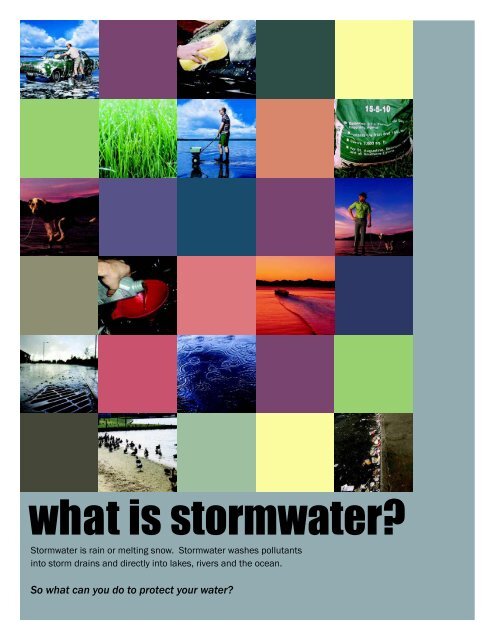what is stormwater?
what is stormwater?
what is stormwater?
You also want an ePaper? Increase the reach of your titles
YUMPU automatically turns print PDFs into web optimized ePapers that Google loves.
<strong>what</strong> <strong>is</strong> <strong>stormwater</strong>?<br />
Stormwater <strong>is</strong> rain or melting snow. Stormwater washes pollutants<br />
into storm drains and directly into lakes, rivers and the ocean.<br />
So <strong>what</strong> can you do to protect your water?
What <strong>is</strong> <strong>stormwater</strong> pollution?<br />
Whether you call it <strong>stormwater</strong> pollution, polluted runoff, people pollution, watershed<br />
pollution or nonpoint source pollution, it all boils down to the same problem:<br />
As <strong>stormwater</strong> travels across lawns, parking lots, gardens, roofs, and roadways, it picks up<br />
trash (such as candy wrappers, cigarette butts and cups) and other less v<strong>is</strong>ible pollutants<br />
(such as gasoline, motor oil, antifreeze, fertilizers, pesticides and pet waste). Th<strong>is</strong> polluted<br />
runoff flows directly into storm drains, rivers, lakes, streams and the ocean. Once polluted<br />
runoff reaches the water, it can contaminate drinking water supplies, kill f<strong>is</strong>h and other wildlife,<br />
and force the closing of bathing beaches because of health threats to swimmers.<br />
Human activity <strong>is</strong> largely responsible for the <strong>stormwater</strong> pollution. Everything that<br />
we put on the ground or into the storm drain can end up in our water. Each of us has<br />
a responsibility to make sure these contaminants stay out of our water. Whether we<br />
have clean water <strong>is</strong> up to you.<br />
But there <strong>is</strong> good news - you have the power to stop your contribution to <strong>stormwater</strong><br />
pollution and keep your environment clean. Simple changes can make a tremendous<br />
difference. Here are just a few ways you can help:<br />
Place litter in trash cans. Place litter, including cigarette butts and fast food<br />
containers, in trash receptacles. Never throw litter in streets or down storm drains.<br />
Recycle as much as possible.<br />
Use less fertilizer. Do a soil test to see if fertilizers are necessary. Fertilizers contain<br />
nutrients that, in abundance, cause blooms of algae that can lead to f<strong>is</strong>h kills. Avoid<br />
the overuse of fertilizers and do not apply them before a heavy rainfall.<br />
Use alternatives to pesticides whenever possible. If you do use a pesticide, follow<br />
the label directions carefully. Many household products made to exterminate pests<br />
are also toxic to humans, animals, aquatic organ<strong>is</strong>ms and plants.<br />
Pick up after your pet and d<strong>is</strong>pose of waste in the garbage or toilet, not the storm drain.<br />
Animal wastes contain bacteria and viruses that can contaminate shellf<strong>is</strong>h and cause<br />
the closing of bathing beaches. Animal waste also contains nutrients that can cause<br />
unsightly algae blooms that can lead to f<strong>is</strong>h kills.<br />
Do not feed ducks and geese. Feeding ducks, geese and other waterfowl causes them<br />
to concentrate in small areas resulting in concentrated animal waste, causing the<br />
same problems as pet waste.
D<strong>is</strong>pose of household hazardous waste properly. Do not pour household hazardous<br />
products down any drain or toilet. Do not d<strong>is</strong>card with the regular household trash.<br />
Use natural and less toxic alternatives whenever possible. Contact your County Solid<br />
Waste Management Office for information regarding household hazardous waste<br />
collection in your area. Many common household products (paint thinners, mothballs,<br />
drain and oven cleaners, to name a few) contain toxic ingredients. When improperly<br />
used or d<strong>is</strong>carded, these products are a threat to public health and the environment.<br />
Recycle all used motor oil. Do not dump used motor oil down storm drains or on the<br />
ground. Take used motor oil to a local public or private recycling center. Used motor<br />
oil contains toxic chemicals that are harmful to animals, humans and f<strong>is</strong>h.<br />
Wash your car only when necessary. Consider using a commercial car wash. Like<br />
fertilizers, many car detergents contain phosphate. If you wash your car at home,<br />
use a non-phosphate detergent and do it on your lawn.<br />
Treat your septic system with respect. Avoid adding unnecessary grease, household<br />
hazardous products and solids to your septic system. Conserve water. Inspect your<br />
tank annually and pump it out every three to five years depending on its use. An<br />
improperly working septic system can contaminate ground water and create public<br />
health problems.<br />
Use marine sanitation devices and pump-out facilities when boating. Observe no<br />
d<strong>is</strong>charge zones. Dumping boat sewage overboard introduces bacteria and viruses<br />
into the water.<br />
Your everyday activities can affect your water. You can help reduce the amount of<br />
pollution in our water. Just being concerned about the environment <strong>is</strong> not enough;<br />
now you can help improve it!


